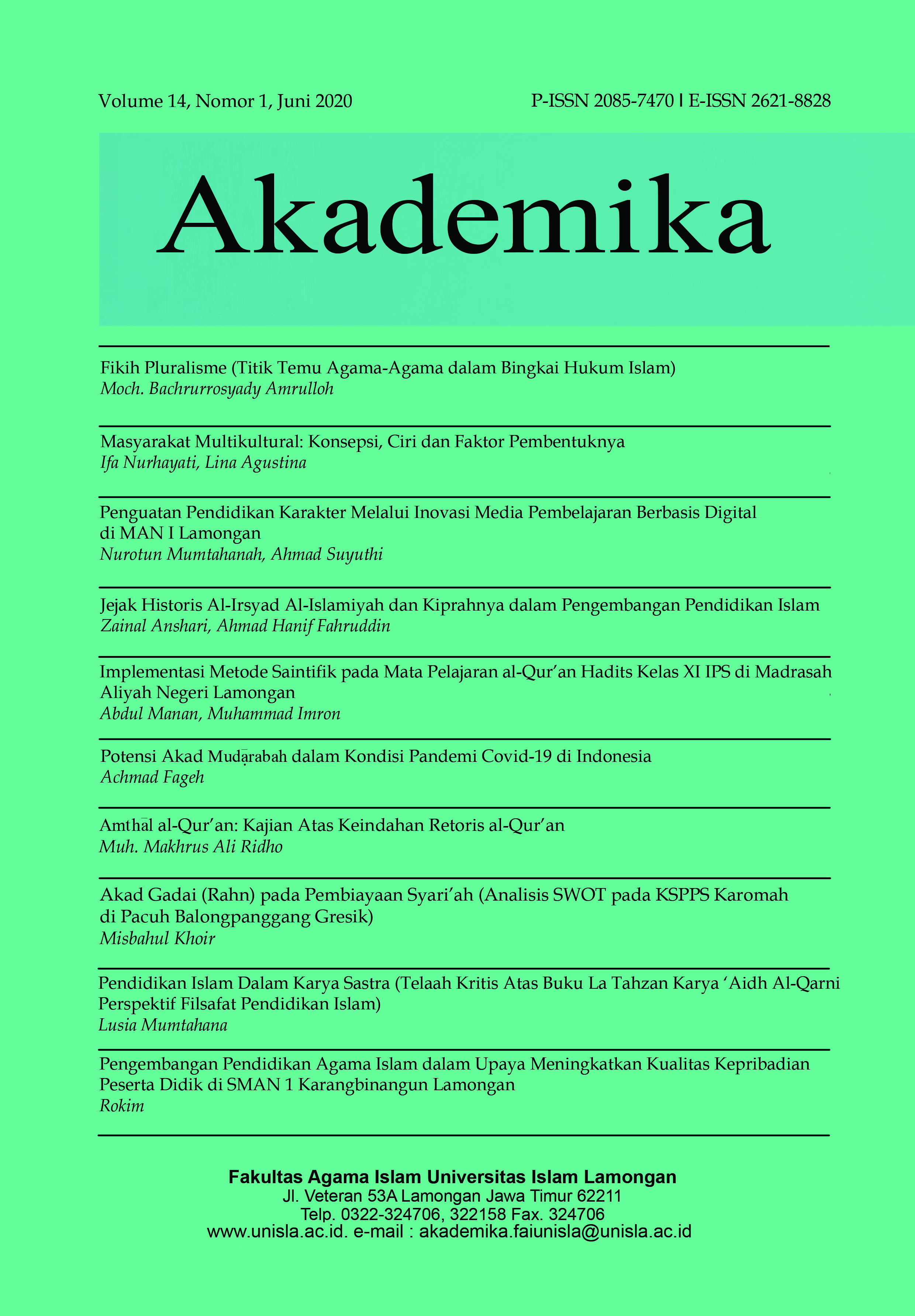Fikih Pluralisme (Titik Temu Agama-Agama dalam Bingkai Hukum Islam)
DOI:
https://doi.org/10.30736/adk.v14i01.183Keywords:
Islamic Jurisprudence, PluralismAbstract
Not a few Muslim communities in Indonesia reject the concept of pluralism, even the MUI itself has issued a special fatwa on the prohibition of this understanding. They assume that pluralism is against Islam, because there is a tendency to equate Islam with other religions. Pluralism is also widely understood as a form of ideology that seeks to justify all religions. Thus, people can change religion as they wish at any time, like people change clothes. Contemporary era Indonesia also witnessed a polemic around this issue. Misunderstanding of the concept of pluralism has at some level created two poles of Islamic understanding between the pros and cons of this concept. Nahdlatul Ulama’ (NU) and Muhammadiyah were even divided internally in their communities. This article will examine through a review of Islamic jurisprudence (fiqh) related to the meaning and nature of pluralism. This research becomes relevant because in addition to the polemic that still exists in this concept, on the other hand the diverse social realities of Indonesian society, also requires an understanding that needs to prioritize tolerance and respect for differences.
Downloads
References
al-Qaradawi, Yusuf. al-Sahwah al-Islamiyah bayn al-Ikhtilaf al-Masyru’ wa al-Tafarruq al-Madzmum: Dirasah fi-Fikih al-Ikhtilaf fi Dau’ al-Nusus wa al-Maqasid al-Islamiyah, Bank al-Taqwa, 1406 H.
Al-Rabi’ah, Abdul Aziz Abdurrahman Ibn Ali. Shuwar min Samahah al-Islam, Beirut: Muassasah al-Risalah, 1980.
An-Na’im, Abdullah. Toward an Islamic Reformation; Civil Liberties, HumanRight and International Law. Terj. Ahmad Suaedy dan Amiruddin Arrani, Yogyakarta: LkiS, 1994.
Bellah, Robert N. Beyond Belief: Essays on Religion in a Post-Traditional World, New York: Harper and Row, 1970.
Ghazali, Abdul Muqsith, Argumen Pluralisme Agama: Membangun Toleransi Berbasis Al-Qur’an, Depok: KataKita, 2009.
Glasse, Cyril. The New Encyclopedia of Islam, Altamira, 2001.
Hasan, Muhammad Tholhah. Pendidikan Multikultural Sebagai Opsi Penanggulangan Radikalisme, Malang: Lembaga Penerbitan Unisma, 2016.
Hornby, A.S., et.al. The Advanced Learner’s Dictionary of Current English, Oxford: Oxford University Press, 1972.
Maarif, Ahmad Syafi’i. Indonesian Consortium for Religious Studies (ICRS), Mengelola Keragaman Di Indonesia Agama dan Isu-Isu Globalisasi, Kekerasan, Gender, dan Bencana di Indonesia, Mizan, 2012.
Masduqi, Irwan. Berislam Secara Toleran Teologi Kerukunan Umat Beragama. Mizan, 2011.
Masud, Muhammad Khalid. “The Scope of Pluralism in Islamic Moral Traditionâ€, dalam Islamic Political ethics, Civil society, Pluralism and Conflict, diedit. Sohail H.Hasmi, Oxford: The Princeton University Press, 2002.
Muhammad. ‘Abid al-Jabiri, al-‘Aql al-siyasi al-‘Araby, Beirut: Markaz Dirasat al-Wihdah al-‘Arabiyah. cetakan III, 1995.
Norton, August Richard. “Terrorism†in John L. Esposito (ed). The Oxford Encylopedia of the Modern Islamic World, New York: Oxford University Press, 1995.
Rusdiana A, Suryana Yaya. Pendidikan Multikultural Suatu Upaya Penguatan Jati Diri Bangsa: Konsep–Prinsip–Implementasi, CV. Pustaka Setia.
Shihab, Alwi. Islam Inklusif: Menuju Sikap Terbuka dalam Beragama, Bandung: Mizan, 1997.
Tim Penulis Paramadina. Fikih Lintas Agama Membangun Masyarakat Inklusif-Pluralis, PARAMADINA Anggota IKAPI, 2004.
Zayd, Nashr Hamid Abu. Mafhum An-Nas, Beirut: Al-Markaz al-Tsaqafy al-‘Araby li al-Thiba’ah wa al-Nasyr wa al-Tawzi’. cetakan III, 1996.














